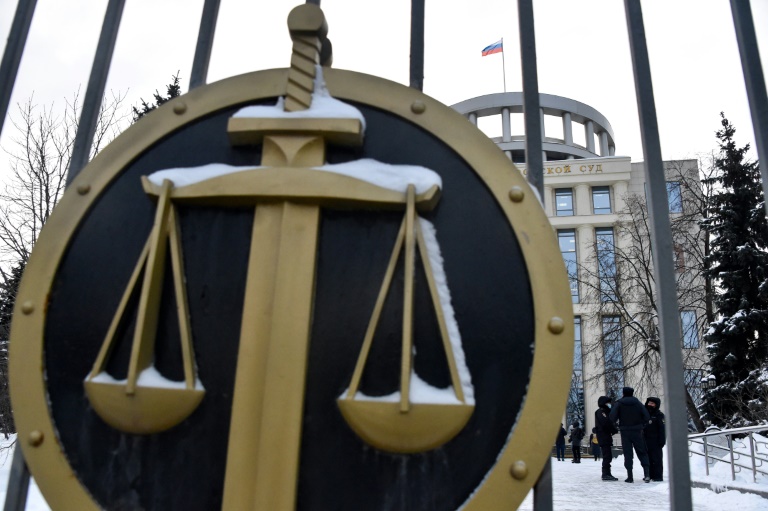Russia’s top rights group Memorial said on Thursday it feared it could be shut down by year’s end as prosecutors argued its work was detrimental to “mental health.”
Prosecutors have asked the Moscow City Court to dissolve Memorial’s Human Rights Centre, which campaigns for political prisoners and other disadvantaged groups, for alleged failures to use the “foreign agent” label on all their publications and for justifying terrorism.
As the court reconvened to hear the case on Thursday, dozens of supporters gathered outside and observers were not allowed in due to the coronavirus outbreak.
Lawyer Grigory Vaipan did not rule out that the court decision could come as soon as next Wednesday, with Russians preparing to ring in the New Year, the country’s favourite holiday.
“The trial is nearing completion,” Vaipan told reporters after the hearing, saying a court decision will “most likely” come next week.
The court adjourned the trial against Memorial’s Human Rights Centre until December 29, days before the vast country shuts down for a 10-day state holiday.
Speaking in court earlier Thursday, prosecutors said Memorial’s failure to properly mark its materials could harm Russians’ “mental health” and cause depression.
“Both the formation of a negative image of the state and the lack of labelling can cause depression among citizens,” said one of the prosecutors.
They also said that the group’s website contained information “justifying terrorism and extremism”, adding that it “negatively affects children”.
Authorities have also brought another case against Memorial International, the group’s central structure, which is also accused of violating the “foreign agent” law.
Russia’s Supreme Court is set to re-convene to hear the case against Memorial International next Tuesday.
The two cases are the largest threat to the organisation’s existence since it was founded in 1989 by rights activists including renowned scientist, Soviet dissident and Nobel peace laureate Andrei Sakharov.
The trials come in a year that witnessed an unprecedented crackdown on opponents of President Vladimir Putin, including the jailing of top opposition politician Alexei Navalny in February.
But the move to shutter Russia’s top rights group stands out and would have been unimaginable a few years ago.
The pressure on Memorial has led to a major outcry in Russia and the West.
– ‘Important work’ –
The Memorial Human Rights Centre releases lists of people it says are political prisoners, including Navalny and members of religious minorities such as the Jehovah’s Witnesses that have been outlawed in Russia.
In October, the organisation said there were at least 420 political prisoners in Russia, noting that their number had risen sharply this year.
As well as political prisoners, the centre also campaigns for groups facing pressure from authorities, including migrants and members of the LGBTQ community.
“Essentially we are doing what prosecutors should be doing — we are helping them,” Alexander Cherkasov, head of Memorial’s Human Rights Centre, said in court.
“Our work is needed and important,” he added.
Activists have called on Putin to intervene, but he told his human rights council that Memorial had been advocating on behalf of “terrorist and extremist organisations”.
– Curbing foreign influence –
During his end-of-year marathon news conference on Thursday, Putin did not address the possible closure of Memorial but said the general crackdown on dissent was aimed at curbing foreign influence.
“I remind you of what our adversaries have been saying for centuries: Russia cannot be defeated, it can only be destroyed from within,” the 69-year-old leader said.
In another case next week, a court in the northwestern city of Petrozavodsk will deliver its ruling on Memorial employee Yury Dmitriyev.
His supporters say he is being punished for his work locating and exhuming mass graves of people killed under Soviet dictator Joseph Stalin’s rule.
Sentenced last year to 13 years in prison on what his supporters say were fabricated child sex charges, the 65-year-old now faces two additional years in prison.
The trials against Memorial coincide with the 30th anniversary of the fall of the Soviet Union marked later this month.











